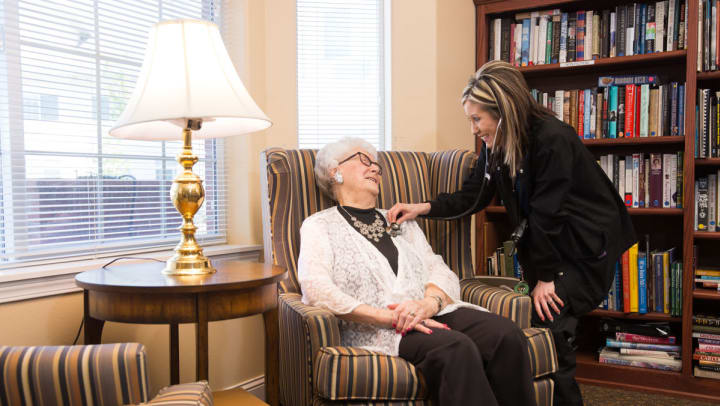June is Alzheimer’s & Brain Awareness Month, and Touchmark is proud to be able to talk about the many resources we offer to those living with Alzheimer’s or other dementia illnesses and their families as well as share helpful information for those who are caring for their loved ones themselves. In this post, Touchmark Vice President of Clinical Services Angela Stewart provides helpful tips for caregivers preparing someone with Alzheimer’s disease for a visit to the doctor’s office.
It is very important to meet routinely with your primary physician and neurologist to recognize changes and treat the symptoms associated with any disease-causing dementia.
Here are three tips for setting your loved one up for success on a visit to the doctor’s office:
-
Timing is key! Schedule the appointment for their typical best time of day, and take care of basic needs (food, hydration, and toileting) before leaving the house.
-
Map for success: Consider who is best to accompany them to the appointment. It can be the legal POA (Power of Attorney), but it doesn’t have to be. It does need to be someone familiar to the person living with the disease who is skilled at communicating the purpose of the visit while redirecting self-advocating or challenging behaviors. The goal is to preserve dignity and include the person in the conversation while skillfully deescalating stress or confusion. An advocate should be prepared to represent any advanced directives or what the person living with the disease would have advocated before their cognition began to decline.
-
Prepare ahead of time: Make the most of this valuable time by identifying—and writing down—the goals ahead of time. This will ensure everything is reported or addressed. Consider reporting or bringing: a complete medication list to reconcile all orders, including over-the-counter and supplements; a log of falls, sleeping, or appetite changes; incontinence changes; and/or behavioral incidents and possible triggers. Also, check if you need to update the POLST (Physicians Orders for Life-Sustaining Treatment).
At some point in the disease process, having a concierge doctor, physician assistant, or nurse practitioner do a home visit or asking to conduct visits virtually might be more advantageous. Choosing to live in community-based memory care can also be beneficial for most in the way of coordinating care with a medical team.
How can caregivers ease anxiety before and during doctor appointments?
The key to maximizing a doctor appointment with someone with dementia is distracting the disappointments. Disappointments can include: the awareness that something is changing with their mental activity; they do not like the change in their routine or environment; they don’t want anyone telling them what to do; or they have a life pattern of avoiding doctor appointments. For most, doctors are a respected authority, and this aligns with most individuals’ goals to live to their highest level of success and wellness.
If an appointment to the doctor’s office increases anxiety in someone with dementia, here are three tips for managing this stress and decreasing disappointment:
-
Plan to motivate. We know the starter button and the ability to sequence tasks are broken. Therefore, plan to explain why using simple terms. Provide reminders. Say it like you haven’t said it before. Slow down, allow ample time, and provide step-by-step nonverbal and verbal cueing.
-
Mirror positive, calm energy. Your energy is contagious. A good mood is your best ally in influencing behavior. Learn how to keep it and get it back. If things go sideways, be quick to apologize or take the blame. Live in the moment and find ways to enjoy the outing. Give compliments, praise, and simple reminders of how this is important to accomplish. Create fun!
-
Listen and look for unmet needs. Because reasoning abilities and vocabulary are some of the first things to decline, setting your loved one up for success is important. Behaviors are an attempt to communicate an unmet meet. Some of the things you are looking for are the following: Are they in pain? Do they need to use the bathroom? Are they in need of food or drink? Is there too much stimulation or noise?
What kind of questions can a caregiver expect to answer at their loved one’s doctor’s appointments? What kinds of questions should caregivers be asking doctors?
Your doctor will want to know what has changed from the last appointment. This would include any information or new medications from other physicians. The doctor might ask about hydration, a pattern of behavior changes or triggers for agitation, bowel movements and perineal care, skin health, sicknesses, infections, significant weight loss, or other health challenges.
Top five topics caregivers should be asking the doctor:
-
Medications: Inquire about reducing polypharmacy based on the proper duration of the drugs and clinical guidelines when mixed with all other medicines, including over-the-counter medications and supplements. If a medication is recommended, ask about its purpose and potential side effects or risks and determine if there are alternatives to drugs or nonpharmacological interventions.
-
Seek an order for additional support: Would the person living with the disease benefit from an update on their POLST, a physician’s order used when someone is in an urgent medical emergency or not responsive? All medical parties follow the directive, which is registered with the state. Inquire if the person qualifies for physical therapy, occupational therapy, speech therapy, home health nursing, palliative care, or hospice evaluation.
-
Call ahead and prime the conversation if you need a backup, professional opinion. For example, if your loved one needs to be convinced or have an authority figure tell the person to stop driving.
-
Inquire about tips to reduce fall risk or how to reduce the risk of harm.
-
Get advice about tracking devices or other supportive equipment recommendations.

